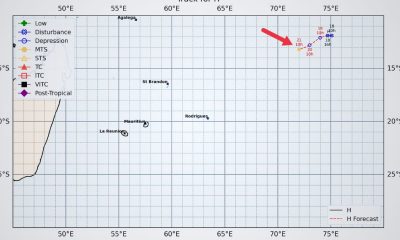News
International Day of Clean Air: Rs 10,000 Fine Targets Polluting Vehicles in Mauritius

Port Louis, Mauritius—The Mauritian government is set to introduce a sweeping overhaul of its air quality regulations, with a focus on cracking down on industrial emissions and exhaust fumes from diesel vehicles.
This move comes as the global community marks the International Day of Clean Air for blue skies, a day dedicated to addressing the often-invisible but deadly threat of air pollution.
The new regulations, currently under revision from their 1998 standards, will bring Mauritius in line with international guidelines from organisations like the World Health Organisation and the World Bank.
The changes will introduce regulated limits for new pollutants, including PM2.5, mercury, dioxins, and furans.
Industrial emissions from nearly 600 businesses, including incinerators and foundries, will also face stricter scrutiny.
Following a six-month grace period after the new rules are implemented, companies will need to comply or face penalties.
A Quiet Threat: Air Quality in Mauritius
While Mauritius isn’t known for the choking smog seen in other parts of the world, air pollution remains a silent but serious concern.
An extensive network of six fixed monitoring stations across the island and four smart sensors in urban and school zones tracks key pollutants like PM10, sulphur dioxide, nitrogen oxides, and ozone.
Data from these stations is publicly available on the official Air Quality Index website and the MoNatir mobile app.
According to the latest data, air quality in the monitored areas is generally good. However, the La Tour Koenig site occasionally records exceedances of the hourly ozone standard, a transboundary pollutant often beyond local control.
Tighter Controls on Diesel Vehicles
In addition to industrial regulations, the government is targeting a significant source of local pollution: diesel vehicles.
Since March 2022, 5,381 vehicles have undergone tests with portable opacimeters to measure the density of black smoke from their exhausts. The results are as follows:
- 668 vehicles exceeded the maximum opacity limit of 70%.
- 666 fixed-penalty fines were issued.
- “Prohibition Notices” were given to offenders, compelling them to re-present their vehicles for inspection within 14 days.
The next phase of the crackdown will see a dramatic increase in fines for non-compliant vehicles. An amendment to the Road Traffic Act will raise the penalty for vehicles exceeding a 50% opacity rate from Rs 2,000 to Rs 10,000.
A Race Against Indifference
The drive to improve air quality is a race against time and public indifference. Air pollution is now the second-leading cause of death globally, responsible for 8.1 million fatalities in 2021, according to the State of Global Air 2024 report.
The issue affects every continent and all age groups, with children under five being particularly vulnerable.
Mauritius, despite its progress in modernising monitoring technology and engaging the private sector, still faces significant challenges. These include:
- The absence of standards for certain ultrafine pollutants until recently.
- Low public awareness of the health impacts of air pollution.
- A lack of data from rural and inland areas, which are poorly covered by existing monitoring stations.
- The absence of a long-term national strategic plan for air quality.
Citizens are being urged to play their part by limiting car usage, avoiding the burning of household waste, and planting trees.
For businesses, the adoption of clean technologies and adherence to new emission standards will be vital.
The air we breathe is a fragile, shared resource that cannot be stored or replaced, and the choices we make today will determine the quality of the air we have tomorrow.
Source: Le Mauricien











